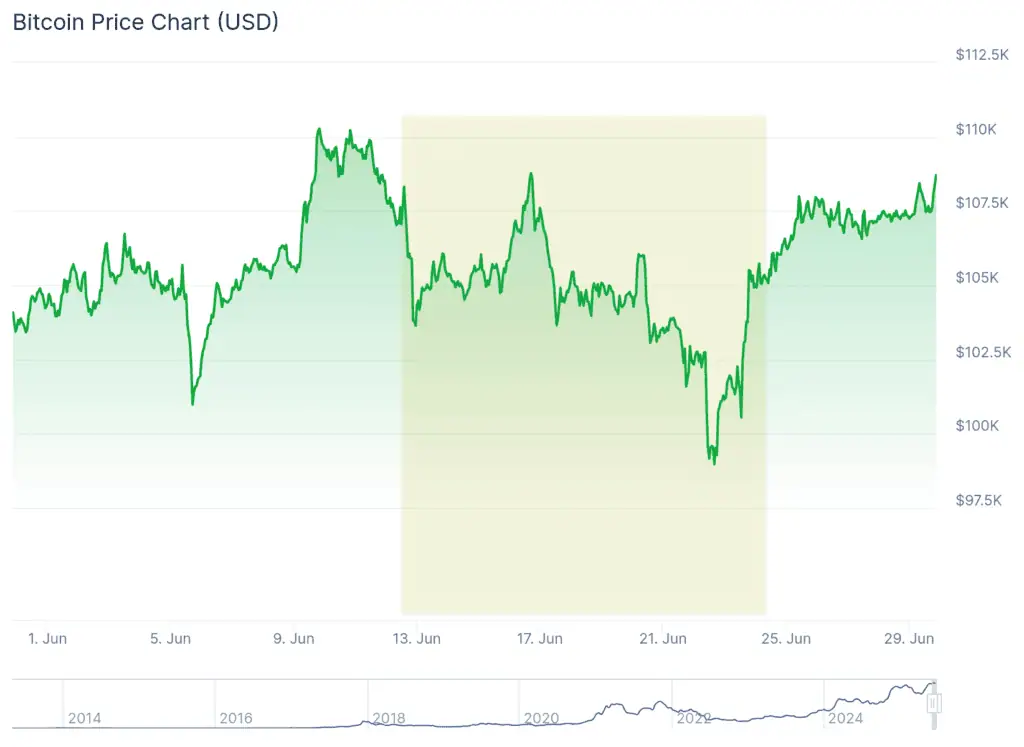
This is how Bitcoin behaves in times of war: chaos or opportunity? Discover how the world's largest cryptocurrency reacts to global crises and what factors influence its volatility during armed conflicts.
When war tensions or geopolitical crises erupt, fear and uncertainty take hold of financial markets, and Bitcoin is no exception. In times like the Russian invasion of Ukraine, the price of Bitcoin fell by as much as 41% in just a few days, making it clear that volatility remains a constant in times of chaos.
More recently, the escalating conflict between Iran and Israel, combined with a US bombing raid, caused Bitcoin's value to initially drop below $98.000, but that drop was followed by a recovery that took it above $107.000, demonstrating a rapid market reaction to these conflicts.
According to experts, this behavior, repeated throughout various crises, shows how wars affect the price of Bitcoin in the short term, but also how it quickly adjusts and recovers, demonstrating resilience each time.
BUY BITCOIN ON BIT2MEWars and Uncertainty: Why Does Bitcoin Fall First, Then Recover?
In times of conflict and high uncertainty, investors' instinct is often to seek refuge in assets considered safer, moving away from volatile options like Bitcoin and cryptocurrencies, which are still perceived as risky assets. This reaction is logical: in the face of a crisis, protecting capital becomes a priority, and traditional assets like gold or Treasury bonds become the preferred options. However, Bitcoin is not only known for its volatility, but also for its crapid recovery capacity after an initial negative impact.
According to a Bitwise analysis, reviewing the 20 most relevant geopolitical events since 2010, Bitcoin showed a surprisingly positive average performance of around 31,2% in the 50 days following each event. These results suggest that initial drops, although often dramatic, can represent opportunities for those who see Bitcoin as an asset with long-term potentialThis characteristic makes Bitcoin an asset that behaves similarly to stocks, as it initially reacts with declines in the face of uncertainty, but can recover if the situation stabilizes or if monetary policies are favorable.
Furthermore, in war contexts, it is common for governments to increase the printing of money to finance the costs of the conflict. This action generates a devaluation of traditional fiat currencies, which in turn makes alternatives like Bitcoin more attractive as a store of value.
Therefore, even if the market shows nervousness at the beginning of a conflict, the depreciation of fiat currencies can bring indirect benefits to decentralized cryptocurrencies.
Bitcoin, volatility, and recovery: what to expect after a crisis?
Recent events, such as the Middle East unrest, continue the pattern of sudden drops in Bitcoin's price followed by rapid recoveries. This confirms that volatility is inherent in war situations, but that stabilization usually comes quickly.
Analysts agree that unless there is a radical change in US monetary policy or an unprecedented global event that disrupts the global economy, Wars usually cause a temporary impact on BitcoinThis effect is more temporary and reverses in the medium term, marking the difference with the more lasting impacts that can generate significant fiscal or monetary decisions, such as the implementation of massive money-printing policies or abrupt increases in interest rates.

Source: CoinGecko
An example of Bitcoin's performance in response to fiscal or monetary decisions can be seen during the COVID-19 pandemic, a period that exemplifies how decisive fiscal policy can be. While the pandemic initially caused prices to plummet, economic stimulus and quantitative easing drove a significant increase in the cryptocurrency's value months later.
On the other hand, in 2022, rising interest rates contributed to downward pressure on the Bitcoin price. Therefore, it's not the conflict itself, but the economic response that can make the difference in the crypto market's behavior.
The above explains why wars and geopolitical crises generate early volatility, but do not necessarily become factors of prolonged decline for the price of Bitcoin. The leading cryptocurrency, being decentralized and not being directly dependent on any government, it offers advantages for those seeking protection against the depreciation of fiat currencies. However, its volatile nature requires investors to be aware of short-term performance and the recovery potential supported by historical data.
BUY BTC FAST AND SAFEWar as a scenario of volatility with opportunities
Bitcoin, as a digital asset supported by blockchain technology, interacts with the global financial market in complex ways. In times of war, the first reaction is often to fall due to the perception of risk.
However, this trend is counteracted in a relatively short period of time by market stabilization and the influence of expansionary fiscal policies that can favor its appreciation. External factors such as money printing and monetary devaluation cause Bitcoin to maintain a unique role as a safe haven asset and store of value, especially when we see government responses that affect the traditional economy.
Analyzing history reveals that wars and geopolitical crises act more as momentary catalysts for volatility than as causes of permanent negative trends for Bitcoin.
Experience shows that, despite sharp declines and initial nervousness, the market-leading cryptocurrency often rebounds and can even surpass its previous levels, offering an optimistic outlook for those with a long-term perspective. Thus, those who understand these dynamics can use crises not only as moments of risk, but also as opportunities to strengthen or diversify their portfolios.

Basic Bitcoin Course
Basic levelStart from scratch in Bitcoin in a clear, easy, safe and quick way. This course is specially designed for beginners practically know nothing about Bitcoin.
Investing in cryptoassets is not fully regulated, may not be suitable for retail investors due to high volatility and there is a risk of losing all invested amounts.


